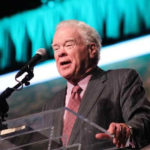CORVALLIS, Ore. (ABP) — While professing to believe the Bible teaches them to submit to their husbands, Southern Baptist women tend to function as equal partners when it comes to most decision-making in the home, according to a new book by an author familiar with Southern Baptist women.
That is due in large part, says author Susan Shaw, to the fact that Southern Baptist girls are taught from a young age to believe they have direct access to God — without any need for an intermediary like a husband or a minister.
Shaw, director of women’s studies at Oregon State University, wrote God Speaks to Us, Too: Southern Baptist Women on Church, Home & Society , from the perspective of both an insider and outsider. She grew up Southern Baptist but now attends a United Church of Christ congregation.
She weaves her own experience with more than 150 interviews of current and former Southern Baptist women from various traditions and backgrounds.
"For years I had been intrigued by the contradictions in Southern Baptist women's lives," Shaw said in an e-mail interview. "They professed to be submissive, but they ran their families and churches. They were Southern women with all of that cultural baggage, and yet they were strong leaders, some even challenging cultural and denominational norms by being ordained and becoming pastors. So I wanted to explore those contradictions and complexities."
SBC women "a rebellious bunch"
She concluded that while the Southern Baptist Convention’s official positions might seem to make women subordinate, Southern Baptist women are, in fact, a rebellious bunch. The level of rebellion varies from ordained women — who defy the decades-old Southern Baptist tradition that girls can aspire to be missionaries but only boys can be called to preach — to stay-at-home moms who view their husbands as head of the home, yet exert significant influence on the direction of their families and churches.
Shaw said Southern Baptist women are a diverse lot, but one thing they share across the spectrum is belief in the Baptist distinctive often termed "soul competency" or "priesthood of the believer." Because of that belief, Shaw says in the book, whether or not a woman views herself as a complete equal to her husband or is assigned to a helper role, she answers only to God in matters of faith.
"The doctrine of the priesthood of the believer has significantly and essentially shaped the identity of Southern Baptist women," Shaw said. "Each woman I interviewed, without reservation, claims that God speaks to her, and, for many women, that belief has empowered them to challenge gender norms in Southern Baptist life. For all of them, that belief has allowed them to negotiate a very strong sense of [moral] agency, even among women who espouse submission" to their husbands or other male leaders.
Sign up for our weekly edition and get all our headlines in your inbox on Thursdays
Shaw said a lot of people would be surprised to learn that Southern Baptist women are stronger and more independent that their popular image might suggest. They know they have power, but they exercise it in different ways — some through traditional ways and some in more feminist fashion.
"God speaks to us too"
"The bottom line, though, is if they feel like God is telling them something, then that's the way they're going to go," she said. "'God speaks to us, too' — that's what they kept telling me."
In the book, Shaw profiles her mother as a typical Southern Baptist woman of her generation. She would say her husband is head of the house, but he would never make a family decision without discussing it with her first.
Shaw turns to her mother's Bible study group, nicknamed "the Clique," as an important focus group representing the older generation of Baptist women.
While they accept the language of male headship, they do not view themselves as powerless in the home. "Man is the head," one member of the Clique comments, "but woman is the neck that turns him."
They aren't afraid to disagree with their pastor and to tell him so. They may believe that only males should be pastors and deacons, but it is common knowledge that without women, the average Baptist church could not function.
Shaw said women who espouse submission still view themselves as equal to men in God's eyes. They see submission based on role, not value, and as a choice they make, not a requirement imposed on them. And they don't see male authority as all-encompassing.
"It's a recognition that at some point in a marriage relationship wives and husbands are going to disagree, and at that point, they believe, the wife's role is to give in to the husband's authority," she said. "But on the whole, what they really practice is a partnership, with give-and-take."
Shaw grew up attending a Southern Baptist church in Rome, Ga. She earned master's and doctoral degrees from Southern Baptist Theological Seminary, was ordained as a minister and taught eight years at California Baptist University. She left the Southern Baptist Convention about 13 years ago, following significant controversy between moderates and fundamentalists over issues such as women’s ordination and the proper role of pastors.
Conservatives ultimately won, and by 2000 they had changed the confessional document of the nation’s largest Protestant faith group to discourage women pastors and teach that each wife should "submit herself graciously" to her husband's “servant leadership.”
Shaw said Southern Baptist women's views are shaped as much by generation as anything else.
"Older women are much more progressive than most people might think," she said. "Women who came of age during the women's movement are more likely to identify as feminist, or at least see feminism as an important development of the '60s and '70s. Some younger women are more conservative than their mothers and grandmothers, but other younger women are on the forefront of progressive social and theological change."
















We seek to connect God’s story and God’s people around the world. To learn more about God’s story, click here.
Send comments and feedback to Eric Black, our editor. For comments to be published, please specify “letter to the editor.” Maximum length for publication is 300 words.